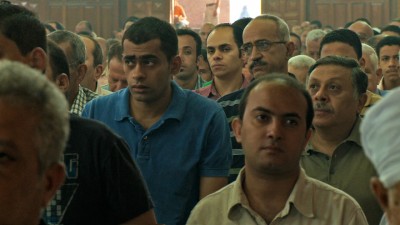| Reviews & Columns |
|
Reviews DVD TV on DVD Blu-ray 4K UHD International DVDs In Theaters Reviews by Studio Video Games Features Collector Series DVDs Easter Egg Database Interviews DVD Talk Radio Feature Articles Columns Anime Talk DVD Savant Horror DVDs The M.O.D. Squad Art House HD Talk Silent DVD
|
DVD Talk Forum |
|
|
| Resources |
|
DVD Price Search Customer Service #'s RCE Info Links |
|
Columns
|
|
|
Virgin, the Copts, and Me, The

Reviewed at the 2012 Tribeca Film Festival
You gotta give Namir Abdel Messeeh this much: he's honest. Before he even rolls the credits of his free-form documentary The Virgin, the Copts, and Me, he plays a voicemail of his producer criticizing him for wanting to make a movie that's "all over the place," asking (just before the title comes up, of course) "Is the film about the Copts, the Virgin, or you?" The "Copts" he's referring to are Coptics, members of the Christian community in Egypt that never converted to Islam. The "Virgin" is the Virgin Mary, whom Coptics say appears to them as an apparition, most famously in Zeitoun in 1968. And the "me" is Messeeh, a French/Egyptian filmmaker and (to say the least) a skeptic.
True to appraisal, the film is a bit all over the place. Messeeh's original aim is to explore that particular 1968 sighting, and these apparitions in general, talking to those (Christian and Muslim) who were there. Siham, his devout mother, has high hopes for the film. "Maybe the Virgin will come to you," she tells him. "You never know!" The Virgin does not turn up for his camera--nor does much of anyone who wants to talk to him, so he first delves into some history (these sequences are first-rate--a fascinating look at a troubled area and complicated conflict) and then, almost in desperation, deciding to examine his ideas through the prism of his own family history, by visiting the village they came from (and where his aunt and elderly grandmother still live).
Siham really doesn't want him to photograph her family. She's dead set against it, in fact. "I'll sue!" she threatens. (They seem fine with it, so long as he's paying.) But when his producer Gregoire grows frustrated with Messeeh's aimlessness and drops out of the project (noting that he didn't raise funds for the filmmaker to shoot "home movies" with his "family out in the boonies"), Messeeh talks Siham into taking over as his producer--which she does, as long as he promises to only do "real films" with "real stories" from here on out.
So what we've got here is a strange hybrid of conventional documentary and the-making-of-the-movie-becomes-the-movie confessional. His cinematic style is hard to get a fix on as well. The handsomely photographed picture is shot in more of a narrative form: conversations in close-ups, heavy editing, occasional flashy angles. It often feels more staged than observed, but it is engaging (though he could do without the frame-lines on the MOS interviews--he doesn't go so far as to use a flashing REC symbol, but it's got the same intention).
Then, oddly, Messeeh does a full-on shift in the third act, deciding that his film should end with a staging of a Virgin apparition in the family's village. It frankly feels like a different film, and initially, a less successful one. Though there are amusing scenes concerning the casting and directing of amateur actors, and Siham continues to shine as a terrific comic character (she rides around the village on a carriage, whipping up the extras with a bullhorn: "You must be on time! Otherwise the film won't be finished!"), it makes the film seem longer than it is--like a double feature, almost. That said, the closing scenes are truly remarkable, somehow capturing both the pull of religion and the magic of cinema--which is, itself, an apparition too. The Virgin, the Copts, and Me recovers somewhat in those final passages; there's much to see and contemplate here, even if the picture itself is wildly undisciplined. Then again, you can't say you weren't warned.
Jason lives in New York. He holds an MA in Cultural Reporting and Criticism from NYU.
|
| Popular Reviews |
| Sponsored Links |
|
|
| Sponsored Links |
|
|
| Release List | Reviews | Shop | Newsletter | Forum | DVD Giveaways | Blu-Ray | Advertise |
|
Copyright 2024 DVDTalk.com All Rights Reserved. Legal Info, Privacy Policy, Terms of Use,
Manage Preferences,
Your Privacy Choices | |||||||











